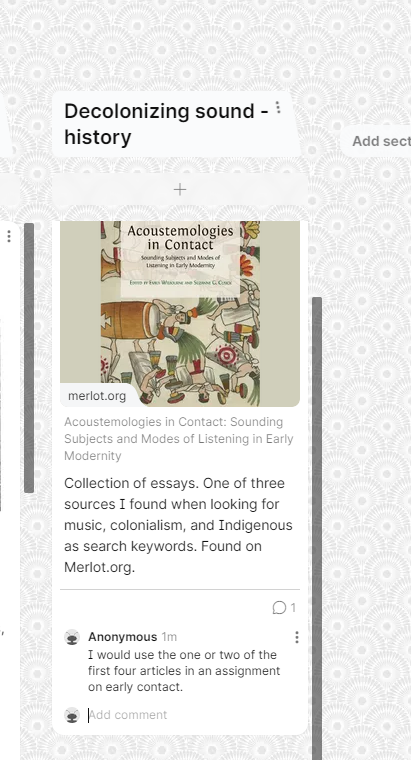Holy CRAAP – Sound history padlet
I could not attach both files, so my CRAAP test is below as well. In answer to the other questions:
- Is there key information missing from the CRAAP test?
- There are other questions I’d want to ask. You can choose from hundreds of sources; why choose this one? Did you choose your sources because they supported your thesis, or did you choose your thesis after reviewing sources? How many sources did you review before choosing this one for your assignment? If the source has made good use of research, how do you know? Does the author or authors use research sources that make sense? Are there any key ones that are missing? Etc etc.
- Do you prefer a different evaluation rubric?
- I’m not sure that I prefer a different evaluation rubric, but I think I would want to use a combination of rubrics, depending on the nature of the assignment.
- If, after completing the CRAAP test, you would not recommend your resource, try to find another one to replace it.
- N/A
CRAAP Test
Resource Title:
Acoustemologies in Contact: Sounding Subjects and Modes of Listening in Early Modernity
Resource URL:
https://www.merlot.org/merlot/viewMaterial.htm?id=773404686
Currency: The timeliness of the information:
When was the resource published or posted?
Has the resource been revised or updated?
Does your topic require current information?
Are the links functional?
This resource was published in 2021. It has not been revised or updated since then. As a series of history essays, this source can stand on its own and won’t need to be updated regularly. The links are functional.
Relevance: The importance of the information for your needs
Does the resource relate to your needs?
Who is the intended audience?
Is the information in the resource at an appropriate level for your learners?
In a study of colonialism and music (and decolonizing music) some of the articles in this collection are more useful than others. I’m much more interested in the articles that focus on colonialism in Turtle Island, so I would focus on the first four or five articles. The intended audience for this text: academics, largely historians or music historians, but I think this would also be of interest to people who study early colonial encounters. I think the information is at an appropriate level for the learners at my institution.
Authority: The source of the information
Who is the creator?
What are their credentials or organizational affiliations?
Are they qualified to write on this topic?
The editors are both Music / Musicology professors. The individual authors of each essay are a mix of historians, musicologists, and scholars of similar specialties, all working at various Universities and Colleges, all of whom are well-respected by their field. They are qualified to write on this topic.
Accuracy: The reliability and truthfulness of the information
Is the information supported by evidence?
Has the resource been reviewed or refereed?
Are there spelling, grammar, or typographical errors?
The information does seem to be supported by evidence and the book has been reviewed. No spelling, grammar, or typographical errors that I noticed.
Purpose: The reason the information exists
Why does this resource exist? (to inform, teach, sell, entertain, or persuade?)
Is the information fact, opinion, or propaganda?
Are there political, ideological, cultural, religious, institutional, or personal biases?
The resource exists to inform others about an understudied topic. It is fact-based. The editors of the collection are clear about their interests and their reasons for undertaking this work.
Notes: Are there additional questions or observations you have about this material that affect your decision to use it? (i.e. this is an opinion piece that I will use to demonstrate one side of an argument).
N.A
Final Recommendation: Will you use this resource? Why or why not?
I would, but not all of it – just some of the articles inside that are most relevant.
Example for "Holy CRAAP – Sound history padlet":
https://bank.ecampusontario.ca/wp-content/uploads/2023/07/Holy-CRAAP-exercise-comment-on-my-padlet-1.png


Leave a Reply